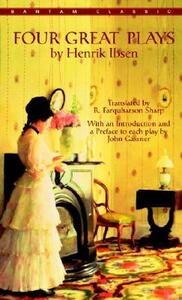Take a photo of a barcode or cover
111 reviews for:
Four Great Plays: Ghosts / The Wild Duck / An Enemy of the People / A Doll's House
Henrik Ibsen, John Gassner, Robert Farquharson Sharp
111 reviews for:
Four Great Plays: Ghosts / The Wild Duck / An Enemy of the People / A Doll's House
Henrik Ibsen, John Gassner, Robert Farquharson Sharp
Henrik Ibsen is a straight-up feminist AND I AM HERE FOR IT! A Doll's House and Hedda Gabler were my personal favorites. Both have such shocking endings - especially when you consider the time the plays were written!
Exams are getting in the way. Finished “Ghosts” and liked it 3/3.25⭐️? Will pick up another time
Ibsen, master of realism. Good stuff. Check it out if you're a fan of theater that feels like reality.
Well, that was interesting.
Ibsen dug deep with his themes in these four plays. Each one struck an uncomfortable nerve in me because these were all rather dark and serious in tone. The only one I can imagine playing out well on stage today is A Doll’s House because it’s a bit more relatable. The other 3 were interesting but honestly kind of strange and not stories that I would personally care to see acted out.
I’m on the fence about Ibsen. 3 stars.
Ibsen dug deep with his themes in these four plays. Each one struck an uncomfortable nerve in me because these were all rather dark and serious in tone. The only one I can imagine playing out well on stage today is A Doll’s House because it’s a bit more relatable. The other 3 were interesting but honestly kind of strange and not stories that I would personally care to see acted out.
I’m on the fence about Ibsen. 3 stars.
reflective
fast-paced
Plot or Character Driven:
A mix
Diverse cast of characters:
No
Four plays, kind of hard to give the book on rating.
A Doll's House: Read this in high school and didn't really have enough life experience to truly get it. Wanted to read it again as an adult to see if it held up (as I still liked it as a 17 yr old, I just didn't totally understand it). It does. It's great. I don't think you can reduce Nora to a passive victim, which is why this is so awesome. Feminism without flattening the character into a caricature.
Ghosts: Also kinda awesome. But also a little ridiculous. Still, I really enjoyed this play and what Ibsen was trying to say about society (what is a woman's place in it, why are some things too taboo to talk openly about, hypocrisy of the church, inability to escape the past, etc)
Hedda Gabler: Not exactly sure how I feel about this one. Probably my third favorite of these four plays. But still very good. Hedda is a truly horrific person and yet you still feel somewhat sorry for her. Not that sorry, but still kind of sorry.
The Master Builder: Definitely my least favorite, but I totally relate to the feeling of old age and being threatened by a new generation. I'm one of the oldest people in my cohort and they never let me forget it. There's always new, sharp first years coming in and making me question if I'll ever get a job somewhere in academia (or really just anywhere lol).
A Doll's House: Read this in high school and didn't really have enough life experience to truly get it. Wanted to read it again as an adult to see if it held up (as I still liked it as a 17 yr old, I just didn't totally understand it). It does. It's great. I don't think you can reduce Nora to a passive victim, which is why this is so awesome. Feminism without flattening the character into a caricature.
Ghosts: Also kinda awesome. But also a little ridiculous. Still, I really enjoyed this play and what Ibsen was trying to say about society (what is a woman's place in it, why are some things too taboo to talk openly about, hypocrisy of the church, inability to escape the past, etc)
Hedda Gabler: Not exactly sure how I feel about this one. Probably my third favorite of these four plays. But still very good. Hedda is a truly horrific person and yet you still feel somewhat sorry for her. Not that sorry, but still kind of sorry.
The Master Builder: Definitely my least favorite, but I totally relate to the feeling of old age and being threatened by a new generation. I'm one of the oldest people in my cohort and they never let me forget it. There's always new, sharp first years coming in and making me question if I'll ever get a job somewhere in academia (or really just anywhere lol).
After hearing about it for years, I finally read A Doll House.
It wasn't what I expected, but the ending was great.
I can see why people love it.
It wasn't what I expected, but the ending was great.
I can see why people love it.
Why does everyone love A Doll's House? It's just rather... shit.
I loved them all, though some really struck different chords with me.
Doll’s House 8/10
Doll’s House is a relentless examination of the web of social forces, money, and power that entangle marital relations. Familial duty and social norms are starkly conflicted with needs for personal development and autonomy, calling into question the basis on which marriage rests. Are our relationships real or are they games we play, filling roles rather than truly connecting and communicating?
I have a high standard for social commentary in art. Often I think a good intention is substituted for good craftsmanship. But for Doll’s House such a compromise is not made. It is wonderfully and compellingly written. Ibsen’s talent for crafting powerful and evocative scenes is demonstrated over and over again and his eye for the complexity and subtly of relationships is impressive. At times the characters in Doll’s House almost feel a bit caricatured, which is probably my only reservation to the play, but it may have also been necessary to help the conservative theater audience of 1879 truly open up to the self-examination the play encourages.
Ghosts 9/10
Ghosts continues many of the themes of Doll’s House. Traditional marital relations and the role casts for women in society are thoroughly explored, but here the sources of this social web are more directly questioned. In particular, the shadow religion casts over families, defining responsibilities and duties, and the social pressures of maintaining reputation in communities, are challenged by an increasingly modern world view. Life is haunted by old ideas, but rebellion against it is more difficult than first thought. In Ghosts social commentary still dominates, but we become more personally invested in the characters and their fates bring a more emotional dimension to drama.
Hedda Gabler 8/10
Hedda Gabler is a force with few competitors in literature, perhaps only to include Shakespeare’ Iago and McCarthy’s Judge. From the first page to the last she is using all of her power to maintain control over her life and those around her. The play marks a transition from the oppression of women explored in Doll’s House and Ghosts, to more general forms of how individuals seek to influence, control, and dominate one another. No one seems to understand this better than Hedda, but in understanding the game of power and control she seeks to out-compete everyone. Such a bold and direct attempt to master those around her raises complicated challenges as sometimes one person’s desire for autonomy results in the diminution of another’s. We follow the conflicts of interests and power as they compete with one another.
The Master Builder 9/10
The Master Builder felt wholly different. While struggles of power and influence shape the contours of the story, like Ghosts the personal stories outgrow their didactic purposes. Instead the story seems more focused on the doubts and insecurities that are then the motivation for domination and manipulation. Those doubts and insecurities are explored as internal conflicts of love and fear, dreams and nightmares, woven together through a terrible and pathetic character, The Master Builder, who Ibsen somehow is able to sustain a sympathy for, and the marvelous Hilde who may be princess or devil, we cannot be sure.
Doll’s House 8/10
Doll’s House is a relentless examination of the web of social forces, money, and power that entangle marital relations. Familial duty and social norms are starkly conflicted with needs for personal development and autonomy, calling into question the basis on which marriage rests. Are our relationships real or are they games we play, filling roles rather than truly connecting and communicating?
I have a high standard for social commentary in art. Often I think a good intention is substituted for good craftsmanship. But for Doll’s House such a compromise is not made. It is wonderfully and compellingly written. Ibsen’s talent for crafting powerful and evocative scenes is demonstrated over and over again and his eye for the complexity and subtly of relationships is impressive. At times the characters in Doll’s House almost feel a bit caricatured, which is probably my only reservation to the play, but it may have also been necessary to help the conservative theater audience of 1879 truly open up to the self-examination the play encourages.
Ghosts 9/10
Ghosts continues many of the themes of Doll’s House. Traditional marital relations and the role casts for women in society are thoroughly explored, but here the sources of this social web are more directly questioned. In particular, the shadow religion casts over families, defining responsibilities and duties, and the social pressures of maintaining reputation in communities, are challenged by an increasingly modern world view. Life is haunted by old ideas, but rebellion against it is more difficult than first thought. In Ghosts social commentary still dominates, but we become more personally invested in the characters and their fates bring a more emotional dimension to drama.
Hedda Gabler 8/10
Hedda Gabler is a force with few competitors in literature, perhaps only to include Shakespeare’ Iago and McCarthy’s Judge. From the first page to the last she is using all of her power to maintain control over her life and those around her. The play marks a transition from the oppression of women explored in Doll’s House and Ghosts, to more general forms of how individuals seek to influence, control, and dominate one another. No one seems to understand this better than Hedda, but in understanding the game of power and control she seeks to out-compete everyone. Such a bold and direct attempt to master those around her raises complicated challenges as sometimes one person’s desire for autonomy results in the diminution of another’s. We follow the conflicts of interests and power as they compete with one another.
The Master Builder 9/10
The Master Builder felt wholly different. While struggles of power and influence shape the contours of the story, like Ghosts the personal stories outgrow their didactic purposes. Instead the story seems more focused on the doubts and insecurities that are then the motivation for domination and manipulation. Those doubts and insecurities are explored as internal conflicts of love and fear, dreams and nightmares, woven together through a terrible and pathetic character, The Master Builder, who Ibsen somehow is able to sustain a sympathy for, and the marvelous Hilde who may be princess or devil, we cannot be sure.



